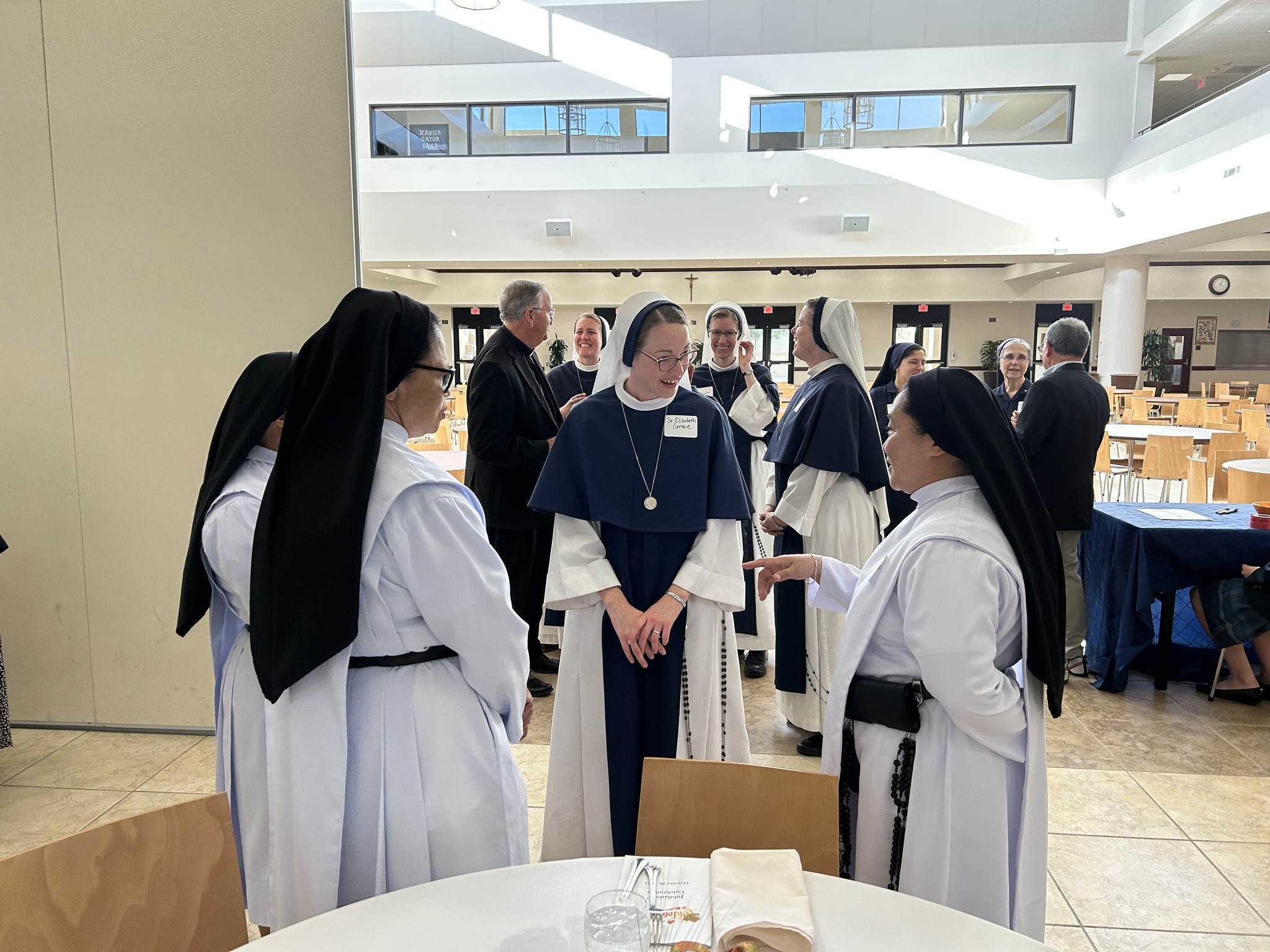At the first-ever consecrated life Octoberfest on Saturday, Oct. 28, at Xavier College Prep, Bishop John P. Dolan honored 14 religious sisters for their service in the Diocese of Phoenix. The occasion for the celebration was the jubilee anniversaries of the sisters’ religious profession.
Sr. Elizabeth Carey, IBVM, 75 years
Sr. Lillian Lila, BVM, 75 years
Sr. Mary Lynn Heiser, SSND, 65 years
Sr. Ann Marley, SSND, 65 years
Sr. Mary Richardine Blue, RSM, 60 years
Sr. Margaret McBride, RSM, 55 years
Sr. Yolanda Mendoza, IBVM, 45 years
Sr. Delia Obenza, OP, 35 years
Sr. Betty Banja, SHS 30 years
Sr. Georgina Victor Abingkwec Dengyanjok, SHS, 25 years
Sr. Mary Fidelis of Our Lady of Angels, PCPA, 25 years
Sr. Kinga Hoffmann, MChR, 25 years
Sr. Mary Susha of the Blessed Trinity, CSST, 25 years
Sr. Meg Walsh, SSNDdeN, 25
Having made it through 25, 50 or 75 years of religious life, jubilarians are well versed in the ways of the Lord. Tried and tested over many years, they are familiar with the discernment process, and each have their own stories to share. However, to one just setting out on the journey toward consecrated life, the path can seem daunting.
With the help of the saints and the advice of the religious of the Diocese of Phoenix, we will take a closer look at the special invitation to consecrated life that God extends to some of his beloved children.
As Christians, we are all called to the common vocation of imitating the charity of Christ through the virtuous living of our baptismal vows. As he creates us, the Holy Trinity weaves a specific vocation into the fabric of our being: a special means by which he invites us to be his own and bring him to others. In common parlance, we call this particular summons our “vocation.”
Discernment, according to the Office of Consecrated Life’s website, is “a process of prayer and probing that gradually uncovers the deepest desires planted by God in a person’s heart.” Discernment is the way that we listen to the “tiny whispering sound” of the Holy Spirit and determine which path he is inviting us to travel on. (New American Bible, 1 Kings 19:12)
During the process of discernment most find themselves being drawn to the vocation of married life, some find the single life to best support God’s mission for them and some experience an attraction to the diocesan priesthood or diaconate. Still, others are drawn to live out their baptismal vows in a more radical way through the evangelical counsels of poverty, chastity, and obedience. This form of life called “religious life” or “consecrated life,” can be found worldwide with thousands of communities for discerners to choose from.
But with so many options, how can a person know which religious community will harmonize with their unique personality and correspond to their gifts? The answer has to do with the community’s charism and how well it fits the discerner.
Charism is a Greek word that means “gift.” In Christianity, charisms are gifts that come from the Holy Spirit, inspiring the members of religious communities to fulfill certain missions for the sake of the building up of the Church. A community’s charism can usually be identified by looking at the life of their founder or foundress.
A striking example of the relationship between foundress and charism can be seen in the Missionaries of Charity. Founded by Mother Teresa of Calcutta, the order’s charism is to serve Christ in the poorest of the poor or, as she would profoundly say, “in the distressing disguise of the poor.” This inspiration grew in Mother Teresa as she meditated on the words of our Lord from the cross: “I thirst.” She was moved to satiate Jesus’ thirst by serving him in the poor, whom she saw not only to represent him, but to literally be his body. Today, the Missionaries of Charity continue to care for the body of Christ by nursing the sick, teaching children and providing shelter to the homeless and abandoned.
For those who have felt a spark in their hearts toward consecrated life, the Office of Consecrated Life offers the following suggestions:
- Pray: Set aside daily quiet time to be with God. This could include attending daily Mass, spending time with Jesus in Eucharistic Adoration or going on a retreat. Many religious communities offer special discernment days or weekends for this purpose.
- Explore: Ask questions and gather information. Reach out to a priest or religious and tell them you are considering consecrated life. Ask them how they discerned God’s call and what they find fulfilling about living their vocation. Home to 31 communities of women religious and at least 6 communities of men, the Diocese of Phoenix provides copious possibilities for consideration. Discover the different communities in the Diocese of Phoenix at Office of Consecrated Life – The Roman Catholic Diocese of Phoenix (dphx.org)
- Seek Guidance: Find a spiritual director (a priest or trained lay person) to help you assess the movement of the Holy Spirit in your life. Meet with them regularly and let them assist you in discernment.
- Finally, when you feel a tug toward a particular community, act! Do not be discouraged by the faults that you may perceive in yourself.
During the process of discernment “we become aware of [our faults] and the wind of the spirit blows into our life to uproot them” said Sr. Mary Fidelis, a jubilarian of twenty-five years and the vocation directress of the Poor Clares of Perpetual Adoration in Tonopah, Ariz.
“Self-knowledge can be hard, and it can be painful, but it is such a blessing!… We put these things in the fire of Jesus’ heart, and we let him consume them. This changes the nature of the fault in a way that feeds the fire of his love and in that fire, we see his divine face light up all the clearer.”
Regardless of our state in life, we all must face our failings. Our Lord told Saint Faustina that “the greatest obstacles to holiness are discouragement and exaggerated anxiety.” Discouragement can get us down and make us think that we are not strong enough to live the magnanimous life God is calling us to. But discouragement does not come from God. Rather, those who set out on the road to God’s heart know that he speaks only in peace.
God is not trying to hide his plans from us or make our vocation an impossible riddle to be solved! Finding our vocation is not so much a choice that we make but the fruit of a seed planted through relationship with Jesus; it is an encounter with God’s love and a response to his gratuitous call.
To those whom he calls, Christ continues to speak these immortal words of encouragement: “Be not afraid”!
“The Lord’s call is not an intrusion of God on our freedom,” Pope Francis proclaimed in his Message for the 56th World Day of Vocations.
“It is not a ‘cage’ or a burden to be borne. On the contrary, it is the loving initiative whereby God encounters us and invites us to be part of a great undertaking. He opens before our eyes the horizon of a greater sea and an abundant catch.”







